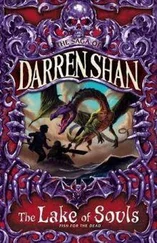The Um Biyara asked to see where the weapons were stored. Samerat laughed and said they had no need of weapons. “We have spears for hunting, but predators can’t reach us up here, so we don’t need anything else.”
Samerat then took them to the top of the cliff, where there was a stretch of flat, arable land, surrounded on three sides by tall, imposing cliffs. In the distance, Jebel caught his first clear glimpse of Amud. It was immense, rising so far above him that he didn’t think he’d be able to see the top even on a cloudless day.
“It’s incredible,” he gasped, temporarily forgetting his pains and worries, able only to marvel at one of the world’s greatest spectacles.
“The home of the gods when they come to Makhras,” Samerat said. “This spot is where they camped while they were building their castle on Amud. That’s why it’s protected.”
“Have you ever seen the gods?” Jebel asked breathlessly.
“No,” Samerat said. “They don’t reveal themselves these days.”
The Um Biyara went exploring the grassland and were edging closer to the cliff at the rear, where large, strange shadows moved slowly across the rock face. When Samerat saw this, he snapped, “Stop!” As they glanced at him with surprise, he said firmly, “You must never go near that cliff.”
“Why?” one of them asked. “Do people live there?”
“No,” he said. “There are no caves.”
“Then why—”
“Please,” Samerat interrupted. “For your own safety, never approach it.”
The Um Biyara were intrigued, as was Jebel, but before they could quiz the boy, he led them back down the tunnels, through the caves, and helped them scale the lower cliff, so that they could link up with the rest of their group and join in the feast, which was still going strong.
For two days the Um Biyara craftily learned all that they could about the cave dwellers and their beliefs. Then, on the third day, Qasr Bint called a meeting and pompously listed all of the cliff people’s sins, declaring their need to repent and join with him and his followers. “Let us save you!” he cried. “Heed our warning. See the light. Accept our word as law.”
The bemused um Hamata didn’t see themselves as sinners and saw no need to convert. The Um Biyara kept pressing, but four days later they realized it wasn’t going to happen, and their mood changed. They cut off all lines of communication and discussed the matter privately within their tents.
Tel Hesani tried to eavesdrop, but they made sure he couldn’t get close enough to hear. The worried slave told Khaz Ali to be wary, that the Um Biyara were sly and cruel, but his new friend laughed and waved away the warning.
Jebel spent most of the time with Samerat and the other children, playing in the tunnels and caves. The break had come as a blessing for him. His wounds healed, and after weeks of near-starvation he was able to put some meat on his bones. As his body recovered, his spirits did too, and the grim events of the past few months started to seem like the vague recollections of a bad dream.
On a cold, cloudy morning, Jebel went looking for Samerat and found him in a cave near the top of the cliff with several adults, Khaz Ali among them. “I can come back later,” Jebel said when he saw that they were busy.
“Wait,” Samerat told him, then had a hushed conversation with his father.
Khaz Ali studied Jebel, then smiled and nodded.
“Come with me,” Samerat said, leading Jebel to the surface.
“What’s going on?” Jebel asked.
“It’s feeding time,” said Samerat mysteriously.
The rest of the um Hamata were waiting on the flat land. A woman was standing apart from the others, holding a lamb. Khaz Ali and his companions joined the group, then they marched towards the cliff to the south, where the strange shadows Jebel had noticed before were moving across the rocks.
“Remember I told you never to go near that cliff?” Samerat said. “Now you’re going to find out why.”
“Is it dangerous?” Jebel asked nervously.
“Yes. But don’t worry; you’ll be fine if you stay with us.”
As they drew nearer, Jebel focused on the shadows. There were nine separate forms, drifting in all directions. He looked up to locate the source of the shadows, but the clouds overhead were unbroken. Then, as the um Hamata came closer to the cliff and stopped, Jebel realized the incredible truth — the shadows were not projections onto the cliff but rather the outlines of shapes inside it.
“What are they?” Jebel gasped.
“Rock spirits,” said Samerat. “They live in the cliff.”
“Trapped?” Jebel asked in an awed whisper.
“Possibly.” Samerat shrugged. “Or maybe they chose to live here. Either way, they never leave. They keep the rocks warm. Without them, this land would be frozen and buried in snow.”
The woman with the lamb had advanced and was standing at the foot of the cliff. As Jebel watched, the shadows joined, forming one giant outline. Then this single shadow slid towards the um Hamata.
When the shadow was a few feet above her, the woman set the lamb down and stepped quickly back. The shadow reached the ground. The lamb looked ghostly white against the dark backdrop. It wasn’t aware of anything untoward and chewed calmly at the grass. Then, in a sudden movement that made Jebel’s heart leap, the rock at the foot of the cliff bulged outwards. The lamb realized it was in danger and tried to leap away, but it was too late.
The rock flowed over the lamb as if made of liquid. The lamb vanished, then reappeared briefly, struggling to break free. Before it could, the rock snapped back into place and resumed its natural shape, hardening instantly, trapping the lamb within its folds. For a minute or so the shadow swirled around the spot where the lamb had been caught. Then it split, and the nine separate shadows resumed their circling patterns.
The um Hamata bowed and departed, leaving Jebel, Samerat, and a few of the other children behind.
When Jebel recovered his wits, he said, “What are they?”
Samerat shrugged. “We don’t really know.”
“They must be gods,” Jebel said. “Wicked gods, or those beaten in battle, who were imprisoned here.”
“Perhaps.”
“Do you worship them?”
“No,” said Samerat. “We sacrifice animals regularly because they need food. According to our records, when the first people came, the shadows were more active, reaching out far and wide to grab a bird, a wild cat, anything that wandered too close. They consumed humans too — several of the original group fell prey to the shadows. But now that we feed them, they’re content. They don’t reach out as far as they did before.”
“Would they consume you if you got too close?” Jebel asked.
“Yes,” Samerat said. “They make no distinction between humans and animals. As long as we keep back, we’re fine, but if we wandered up to the cliff by accident…” He made a choking noise.
“I’ve never seen anything like this,” Jebel murmured, watching the shadows move across and within the rocks. Where the lamb had been caught, he saw the outline of its body, face turned in, hind legs jutting out slightly. It looked as if it was a weirdly shaped formation that had been there forever.
The rock spirits put Jebel in mind of Tubaygat. The thought that they might be the spirits of old gods reminded him of the god he had set out in search of all those months ago, and made him wonder if Sabbah Eid was anything like these shadows, trapped within the rocks of an al-Meata mountain.
“Do you want to go?” Samerat asked after a while. “They won’t do much else.”
“I’d like to stay awhile,” Jebel said. He knew that this was something special, and he’d probably never see its like again.
Читать дальше







